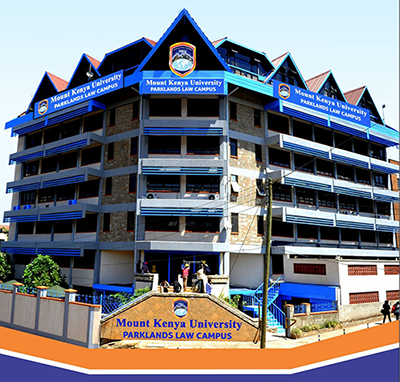
The idea behind the establishment of the University dates back to 1996 when the precursor of the University, the Thika Institute of Technology was founded as a Computer Outreach Program. At this point in time in Kenyan history, the development of Information Communication Technology (ICT) both Mobile Telephony and Computer Technology had started gaining an upward momentum in rural and urban centres.
In the year 2000, the Institute developed into a commercial college offering management and computer training programmes. Later in the year the Ministry of Education Science and Technology recognized the institute as a full fledged institution of higher learning and granted it a full registration approval.
In order to remain relevant with the training needs of the society, the institute initiated training programmes in the fields of paramedical, Information Technology, and Business and Entrepreneurship education in the year 2002.
In the year 2005 the Institute became the 1st private institution in Kenya to be allowed to train Pharmaceutical Technologists by the Pharmacy and Poisons Board of the Ministry of Health.
In the year 2006 the Commission for Higher Education (CHE) validated and approved the institute’s request for collaboration with JKUAT to offer both Diploma and Degree programmes. The Institute continued to work closely with the Commission for Higher Education in line with the stipulated guidelines for establishing a privately funded university.
After fulfilling all the requirements as stipulated in the guidelines of establishing a privately funded university (1989 rules), the Commission for Higher Education issued MKU with the authority to establish a full fledged privately funded university with Thika Institute of Technology as its precursor/forerunner.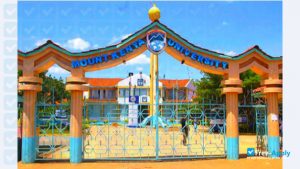
Mount Kenya University (MKU) is a private, multi-campus, chartered university in Kenya. It was founded by Simon N. Gicharu. MKU is one of the largest private universities in the country, with a student body in excess of 52,000, as at September 2015.
| Motto | Unlocking Infinite Possibilities |
|---|---|
| Type | Private university |
| Vice-Chancellor | Prof. Peter Mwangi Ag VC |
|
Academic staff
|
5,000+ |
| Students | 52,000+ (2015)[1] |
| Location |
, |
| Colours | Light Blue, Light Orange, Cream |
| Nickname | MKU |
| Affiliations | IUCEA, ACU, UC-USA, NKU-USA |
| Sports | 25 teams |
| Website | www |
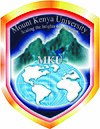 |
|
Location:
The main campus of MKU is located in Thika, approximately 47 kilometres (29 mi), by road, northeast of Nairobi, the capital and largest city in Kenya.
The universities maintains campuses at the following locations, as of October, 2019.
- Main Campus – General Kago Road, Thika
- Mombasa Campus – MKU Plaza, Nkurumah Road, Mombasa
- Nairobi Campus – MKU Towers, Nairobi
- Parklands Law Campus
- Open Distance and Electronic Learning (ODEL) Center – Main Campus
- Nkubu Campus – Meru Majani Tea Sacco Plaza, Nkubu, Meru
- Nakuru Campus – Great Rift Plaza, opp Valley Hospital, Nakuru
- Kisii Campus – Gesonso, Kisii-Migori highway, Kisii
- Eldoret Campus – Eldoret
- Kakamega Campus – Kakamega
- MKU Rwanda Campus – Kagarama kicukiro Kigali
MKU Centres ,Marketing Offices and Country Offices
- Kisumu Centre – Reliance Building, Oginga Odinga Road, Kisumu
- Kericho Centre – Sinender Plaza, Kericho
- Malindi Centre- 2nd Floor, Noor Plaza, Malindi.
- Nyeri Centre- MKU Plaza Nyeri
- Kitale Office – Kitale
- Isiolo Office, MKU Plaza, Isiolo
- Garissa Office – Corner Plaza & Kenya Commercial Bank Building, Garissa
- Hargesia Office – Shacab Area (Former UNICEF Building), Hargesia, Somaliland
- Kampala, Uganda Office – 3 – 5 Bombo Road, Kampala
- Bujumbura ,Burundi – Ground Floor, ABC Building, Avenue de l’Amitié, Bujumbura
The institution was founded in 1996 as Thika Institute of Technology. In 2000, the Institute developed into a commercial college offering management and computer training programmes. Later in the year the Ministry of Education, Science and Technology recognized the institute as a full-fledged institution of higher learning and granted it a full registration approval. In 2005 the Institute became the 1st private institution in Kenya to be allowed to train pharmaceutical technologists by the Pharmacy and Poisons Board of the Kenya Ministry of Health.
In 2006 the Commission for Higher Education (CHE) validated and approved the institute’s request for collaboration with JKUAT to offer both diploma and degree programmes. After fulfilling all the requirements, the Commission for Higher Education issued MKU with the authority to establish a full-fledged privately funded university. In 2011, the university was awarded a charter by the government of Kenya, upon the recommendation of the Commission of Higher Education.
Academics:
The university is organised into eight schools, one college and one institution:
- School of Business and Economics
- School of Education
- School of Engineering, Energy and the Built Environment
- School of Pure and Applied Sciences
- School of Social Sciences
- School of Law
- Graduate School
- School of Computing and Infomatics
- College of Health Sciences
- Medical School
- School of Pharmacy
- School of Clinical Medicine
- School of Nursing
- School of Public Health
- Institute of Film, Creative and Performing Arts
Students at MKU are explicitly trained and equipped with diagnostic, promotive, curative and preventive professional skills. For the record, Mouth Kenya university graduates rank high in Kenyan healthcare structure. Moreover, these graduates have widened Kenyan employment market both in private and public health facilities.
MKU graduates are deemed knowledgeable and are top in delivering quality health care services to the community. The institution is relentlessly working to be a center of excellence for learning and innovate research in health care. The core pillar of learning at MKU is the sustainable national development
All Versity courses offered and the price at which they are offered:
i. Department of Medical Laboratory Science Fee Structure
Here the courses and their annual payable fee
Ph.D. in Medical Laboratory Science (200,000)
Bachelor of Science in Medical Lab Sciences (75,550)
M.Sc. in Medical Lab Sciences (84,550)
Diploma in Biomedical Laboratory Sciences DBMLS (34,550)
Diploma in Medical Laboratory Sciences DMLS (34,550)
ii. Department of Nutrition and Dietetics Fee Structure
Course and annual payable fee (KSh)
Master of Science in Nutrition and Dietetics (70,000)
Diploma in Nutrition and Dietetics DND (34,550)
B.Sc. in Nutrition and Dietetics (54,550)
Certificate in Nutrition and Dietetics CND (29,550)
iii. Department of Dental Science fee structure
Courses and annual payable fee (KSh)
Bachelor of Science in Dental Technology BSCDT (79,550)
Diploma in Dental Technology DDT (49,550)
Diploma in Community Oral Health (49,550)
Bachelor of Science in Oral health (79,550)
2. School of Public Health
MKU is a premier institution with a greater focus on research, public involvement, and training in the context of public health. The institution has attained remarkable results in advancing it’s public health solutions. MKU has achieved exemplary findings of its vision of scaling the heights of education.
Public health studies at MKU is peculiar for its sustainability and equitability. The school is committed to render excellent education adaptable to global standards. it is the primary mission of the institution to mentor, counsel, coach and instruct learners appropriately in public health
a. Department of Epidemiology and Bio-Statistics Fee Structure
Courses and annual payable fee (KSh)
Ph.D. in Public Health (200,000)
Master of Public Health MPH (70,000)
Master of Public Health in Reproductive Health (Virtual 50,000) and (Regular 70,000)
b. Department of Environmental Health Fee Structure
Courses and annual payable fee (KSh)
M.Sc. in Food Hygiene and Safety (79, 550)
Bachelor of Science in Environmental Health BSCEH (59,550)
Diploma in Environmental Health Science DEVH (29,550)
Master of Public Health Nutrition (79,550)
c. Department of Community Fee Structure
Courses and annual payable fee (KSh)
M.Sc. in Health Promotion, Education, and Development (79, 550)
Certificate in Community Health and HIV/AIDs Management CCH (24,550)
Bachelor of Science in Community Health (54,550)
Diploma in Community Health and HIV/AIDs Management DCH (29,550)
Master of Science in Community health (Weekends) (79, 550)
d. Dept. of Health Management and Informatics Fee Structure
Courses and annual payable fee (KSh)
Bachelor of Science in Health System Management (54,550)
Master of Science in Health System Management (79,550)
3. School of Clinical Medicine Fee Structure
Courses and annual payable fee (KSh)
B.Sc. Community Health & Clinical Med.(98,550)
Master of Clinical Medicine (104,550)
Diploma in Health Records (Upgrading) DHRIT-UP (29,550)
B.Sc. in Information Management & Health Records (54, 550)
Information Technology & Health Records (Certificate) (29,550)
Diploma in Clinical Medicine DCM (56,000)
4. SCHOOL OF PHARMACY Fee Structure
Courses and annual payable fee (KSh)
Diploma in Pharmaceutical Technology DPT (34,550)
Bachelor of Pharmacy BPHARM (98,550)
Post graduate Diploma in Pharmaceutical (59,550)
5. SCHOOL OF NURSING Fee Structure
Courses and payable fee (KSh)
Master of Science in Nursing MSCN (100,000)
Doctor of Philosophy in Nursing (200,000)
Bachelor of Science in Nursing (85,550)

6. Fee Structure For The School Of Pure And Applied Sciences
i. Biological Sciences
Courses and payable fee (KSh)
Master of Science in Applied Entomology MSCAE (59,550)
Ph.D. in Entomology (150,000)
PhD in Zoology (150,000)
PhD in Conservation Biology (150,000)
Bachelor of Science in Applied Biology BSCAB (54,550)
PhD in Zoology (150,000)
Ph.D. in Molecular Biology (150,000)
Msc. in Ecology and Conservation (59,550)
PhD in Ecology (150,000)
Certificate in Bridging Biology CBB (20,550)
PhD in Biochemistry (150,000)
B.Sc. in Environmental Science- SB and Weekend (54,550)
B.Sc. in Food Science and Processing (Weekend and SB) (54,550)
Bachelor of Science in Biotechnology BSCBIOTEC (54,550)
Diploma in Food Science and Processing Technology DFSP (29,550)
ii. Department of Physical Sciences Fee Structure
Courses and payable fee (KSh)
PhD in Natural Products Chemistry (150,000)
Bachelor of Science in Industrial Chemistry BSCIC (54,550)
Pre-University PU (24,550)
Master of Science in Statistics (59,550)
PhD in Chemistry (150,000)
Diploma in Science Laboratory Technology (29,550)
Bachelor of Science in Laboratory Science BSCLS (54,550)
Bachelor of Science in Statistics (59,550)
Certificate in Bridging Mathematics CBMATHS (20,550)
Master of Science in Statistics (59,550)
Certificate in Bridging Chemistry CBC (20,550)
Bachelor of Science in Actuarial Science BSCAS (45,550)
iii. Department of Animal Health Production Fee Structure
Courses and payable fee (KSh)
B.Sc. in Animal Health and Production (59, 550)
Health and Production CAH (29,550)
Certificate in Artificial Insemination CAI (33,600)
Agriculture and Rural Development (Bachelor of Science)(54,550)
PhD in Immunology (150,000)
Bachelor of Science in Animal Science (54, 550)
Diploma in Animal Health and Production DAH (34,550)
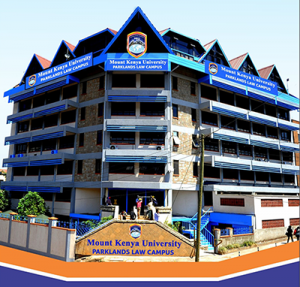
7. School of Computing and Informatics Fee Structure
Mount Kenya University Computing and informatics school is a critical player in social, technological advancement. The school advocates for high-class academic prowess among learners who reflect top professional achievements. Besides attaining high caliber, the institution focused on sustaining and maintaining its far-reaching legacy. This school is determined to excel in computing education and its applications.
School of Computing and Informatics Departments
- Department of Information Science and Knowledge Management
- Department of Information Technology
- Department of Enterprise Computing
i. Department of Information Technology
Courses and payable fee (KSh)
Master of Science in Information Technology MSCIT (59,550)
Diploma in Information Technology DIT (24,550)
Certificate in Information Technology CIT (20,550)
Bachelor of Science in Information Technology BSCIT (45,550)
Master of Science in Cyber Security (59,550)
Diploma in Information System (24,550)
ii. Information Science and Knowledge Management Fee Structure
Courses and payable fee (KSh)
Bachelor of Science in Information Science BSCIS (45,550)
Master of Science in Information Science MSCIS (69,550)
Diploma in Information Science DIS (24,550)
iii. Department of Enterprise Computing fee structure
Some of the most enrolled Mount Kenya University business courses are as outlined below;
Courses and payable fee (KSh)
Certificate in Business Information Technology CBIT (20,550)
Bachelor of Business and Information Technology (45,550)
Diploma in Business Information Technology DBIT (24,550)
8. School of Engineering, Energy and Built Environment Fee Structure
Mount Kenya university offers competitive engineering training and environment-oriented courses. These programs are deliberately prepared to enable learners to comprehend their environment and the need to safeguard it against destruction. Energy programs are also specially designed to blend into the fight against global energy crisis.
i. Department of Energy and Environmental Engineering
Courses and payable fee (KSh)
Environmental and Energy Technology (Bachelor of Science) (54,550)
B.Sc. in Petroleum Exploration and Production (54,550)
ii. Dept. Electronic and Electrical Engineering
Courses and payable fee (KSh)
Diploma in Medical Engineering DME (29,550)
Diploma in Electrical and Electronic Engineering DEE (29,550
9. School of Business and Economics Fee Structure
a. Department of Management
Courses and payable fees(ksh)
Procurement and Supplies Management (Master of Science) (59, 550)
Management & Office Administration (Master of Science) (59,550)
Human Resource Development (Master of Science) (59.550)
Business Administration and Management (Doctor of Philosophy) (200,000)
M.Sc. in Management & Project Planning (59, 550)
B.Sc. in International Business Administration (54,550)
Master of Science in Marketing (59,550)
BBM Bachelor of Business Management (45,550)
Diploma in Entrepreneurship DEP (24,550)
Bachelor of Arts in Public Administration (54,550)
Master of Science in Entrepreneur (59,550)
Diploma in Project Management DPM (24,550)
Diploma in Human Resource Management DHRM (24,550)
Management and Public Administration (Master of Arts) (59,550)
Diploma in Business Management DBM (24,550)
Diploma in Marketing Management DMM (24,550)
Certificate in Marketing Management CMKT (20,550)
Certificate in Entrepreneurship CEN (20,550)
B.Sc. in Management & Office Administration (54, 550)
Diploma in Supplies and Procurement Management DSPM (24,550)
Bachelor of Office Administration and Management (54,550)
Certificate in Project Management CPM (20,550)
Certificate in Business Management CBM (20,550)
Certificate in Supplies and procurement Management CSPM (20,550)
Certificate in Human Resource Management CHRM (20,550)
b. Department of Economics Fee Structure
Courses and payable fee (KSh)
Bachelor of Economics and Finance BECF (45,550)
B.Sc. in Statistics & Economics (45,550)
Master of Arts in Economics (59,550)
B.Sc. in Economics (45,550)
Bachelor of Science in Finance and Statistics (45,550)
c. Department of Accounting and Finance Fee Structure
Courses and payable fee (KSh)
Master of Business Administration MBA (59,550)
Master of Science in Accounting (59,550)
Diploma in Micro-Finance (24,550)
Master of Science in Finance (59,550)
Bachelor of Commerce BCOM (45,550)
Diploma in Banking and Finance DBF (24,550)
Doctor of Philosophy in Business Administration (250,000)
Real Estate Management (Bachelor of Science) (54,550)
READ ALSO: Maasai Mara University Courses Offered
10. School of Hospitality, Travel, and Tourism Fee Structure
Courses and payable fee (KSh)
Travel and Tourism Management (Bachelor of Science) (54,550)
Certificate in food and beverages (24,550)
Diploma in Travel and Tourism Management DTTM (32,55)
Certificate in Hospitality Operations (24,550)
Bachelor of Science in Hospitality Management BSCHM (54,550)
Certificate in Food Production (24,550)
Masters of Science in Hospitality Management (59,550)
Certificate in Travel and Tourism Management CTT (29,550)
Diploma in Hospitality Management DHM (32,550)
11. School of Law Fee Structure
Courses and payable fee (KSh)
Diploma in Law DLAW (49,000)
Bachelor of Laws BLAW (70,000)
Master of Laws (100,000)
12.School of Social Sciences Fee Structure
i. Department of Psychology
Courses and payable fee (KSh)
Master of Arts in Counseling Psychology MACP (59,550)
Bachelor of Counseling Psychology BCP (45,550)
Doctor of Philosophy (Ph.D.) in Counseling Psychology Ph.D. COUNS (250,000)
Diploma in Counseling Psychology DCP (24,550)
Postgraduate Diploma in Counseling Psychology (49,550)
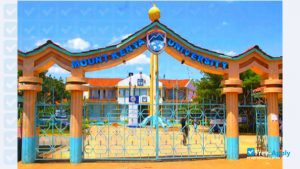
ii. Department of English And Foreign Languages Fee Structure
Courses and payable fee (KSh)
English Language and Linguistics (Master of Arts) (59,550)
Certificate in English Language and Proficiency (20,550)
PhD in Literature in English (200,000)
Bachelor of Arts in French (45,550)
Certificate in Chinese Language and Proficiency (20,550)
Bachelor of Arts in the Arabic Language (45,550)
Master of Arts in Literature (59,550)
PhD in English & Linguistics (200,000)
Certificate in Bridging English CBE (20,550)
iii. Department of Kiswahili And Other African Languages Fee Structure
Courses and payable fees (KSh)
Master of Arts in Kiswahili MAKI (59,550)
PhD in Kiswahili (200,000)
Certificate in Bridging Kiswahili CBK (20,550)
Master of Arts in Kiswahili MAKI (59,550)
iv. Department of Humanities fee structure
Courses and payable fee (KSh)
Master of Arts in History (59,550)
Master of Arts in Geography (59,550)
Diploma/Certificate in International Relations (Public) (24,550)
Master of Arts in Religious Studies (59,550)
Bachelor of Arts in International Relations (54,550)
Master of Arts in Philosophy (59,550)
Certificate in Environmental Impact Assessment (20, 550)
International Relations and Diplomacy (Master of Arts) (59, 550)
Ph.D. RS Doctor of Philosophy (Ph.D.) in Religious Studies (250,000)
v. Department of Social and Development Studies fee structure
Courses and payable fee (KSh)
Master of Arts in Development Studies MADS (59,550)
PhD in Development Studies (200,000)
Diploma in NGO Management (24,550)
Bachelor of Arts in Community Development BCD (45,550)
Bachelor of Social Work and Administration (45,550)
PhD in Sociology (200,000)
Bachelor of Arts in Sociology (45,550)
Post Graduate Diploma in Monitoring and Evaluation PGDME (45,550)
Master of Arts in Monitoring and Evaluation MAM (59,550)
Community Development & Social Work (Certificate) (20,550)
Master of Arts in Sociology (59,550)
Sociology & Development Studies (Bachelor of Arts) (45,550)
Social Work & Community Development (Diploma) (24,550)
Bachelor of Development Studies BDS (45,550
Mount Kenya university address, phone number, email and complaints number;
P. O. Box 342-01000, Thika, Kenya
Tel:+254 672 820 000 / 0709 153 000
Cell:+254 720 790796 Pilot Number : 0709 153 000
Complaints line: 0709 153 200 WhatsApp +254 722 999 399
E-mail:- info@mku.ac.ke / customercare@mku.ac.ke











